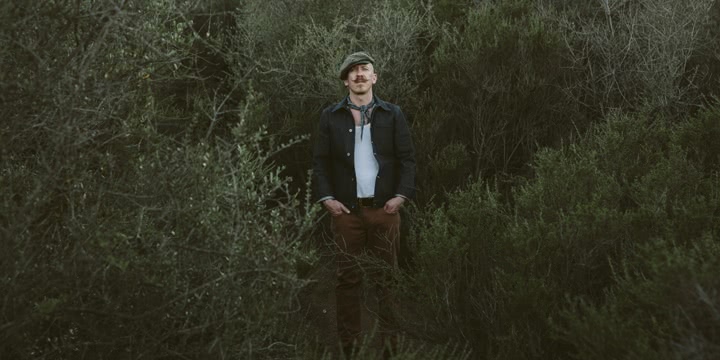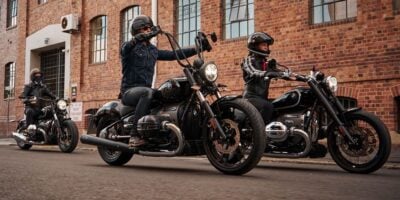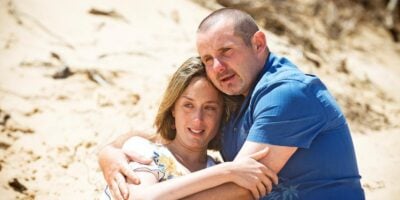Ah, the Irish. It’s a heartfelt cliché that no matter what they say, you can’t help but fall a little bit in love with them.
While it’s doubtful that Foy Vance and I are exactly each other’s type… Well, a man can dream.
Vance has also had the singular pleasure of supporting not only Ed Sheeran on a slew of stadium tours (no small feat), but also Captain Fantastic himself, Elton John. From those bewildering stadium stages, he is now sprinting across Australia for a much more intimate, no less inspiring tour. In terms of content though, well, Vance is keeping his ego entirely in check.
“Well, let’s start by noting that I don’t have any hits, so I certainly don’t play them,” he laughs. “With each show, it’s all different. With Elton we picked a set that felt right but always left a little room to manoeuvre if a certain song or sound was going down well in a particular venue. Essentially you’re just trying to set out the parameters of what you do for each audience; to give them the chance to get into you or not. That’s the beauty of these gigs. I’ve been invited onto them: there’s no real pressure. I’m not paying the promoters, I’m just setting up, singing for a while, and if people want to get on board and come to the next show, that’s great. If they don’t, I’m good with that. I get to see interesting places and meet amazing people.”
He is being modest – his award-winning second album Joy Of Nothing features the likes of Bonnie Raitt and Mr Sheeran on guest vocalist duties, while his third record The Wild Swan is likely to prove his commercial breakthrough – but the arc of his career has not always seemed the stuff of inevitable acclaim. In one of those moments of research that makes you sit up and think, “Huh. Now that’s interesting”, prior to success Vance performed workshops in a handful of English prisons.
“I did it because music is something I find completely redemptive and restorative,” he explains. “It helps me sort stuff out, still. It’s a powerful tool, and I think you can get so lost in this day and age by the commercialism of it: trying to make something that sounds good on radio, trying to make something that looks good on TV. That’s not where music comes from. That’s not what music is about for me.
“It’s something way more profound than that, something you can never really quite put your finger on. And I just thought it would be interesting to explore that with people who are in need of some kind of change. It was weird sometimes, because there are some people who are sitting there and you’re thinking, ‘You know, some of these people have done really awful things.’ At that stage I didn’t know if I was going to keep on touring or if I wanted to do something different, and that was one thing I thought I could get into. Go in and work with people like that.”
Vance’s sentiment that music can be a restorative force is paralleled in the majority of his music. There is a hopefulness to his lyrics, regardless of timbre and mood – from the grounded titular track ‘Joy of Nothing’, to the more raucous ‘Fire It Up’, Vance seems like a thoroughly optimistic fellow. The prospect of turning his pen to different forms however – say, stretching that lyrical prowess into a novel – is met with a sigh.
“You know what, I’d love to say yes because I love writing and I love the idea. But I know writers and have a vague idea of what it takes to write a novel, and it’s such a commitment. I’d love to try it at some stage later in life if I could, but you know … I don’t even know if I’d know what to say. I guess a novel that’s just a break from reality would be interesting, but I certainly don’t have the chops now. You get away with so much in songs because it’s not just about the lyrics. The way you sing that lyric, the inflection, you’ve got a lot of legroom. Whereas writing a book is so exposed.”
I hazard that songwriting is itself quite an exposing effort, and certainly one that many performers struggle with. But Vance is incredibly at ease with sharing himself with the world and pinning down his inspirations and sending them adrift into the universe doesn’t seem to cause him much anxiety.
“It usually happens in the weirdest places,” he laughs of his writing habits. “I’ve come up with so many songs on toilets, I can’t tell you. Whenever it comes, you need to snatch it and see where it leads. I have friends who are more formulaic about their writing. They get up at nine and finish at five, they take lunch breaks. For me, I couldn’t do that. That would kill me. You know what really inspires me? We were talking a minute ago about people making music for commercial gain. What really inspires me is those people from the plains of Africa, for instance. They’re going through droughts and famines, all kinds of horrendous issues they have to deal with. But every night, the fire is lit. They’re singing and dancing, transcending themselves. That’s where music is for me. That release from yourself.”
Foy Vance performs atThe Basement, Wednesday September 14.The Wild Swan is out now through Gingerbread Man/Atlantic.


































